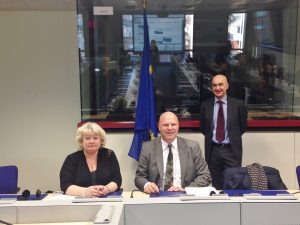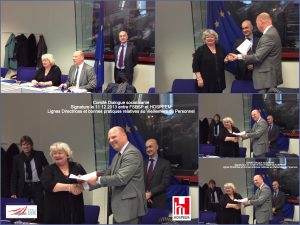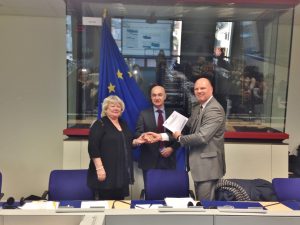The European Hospital and Healthcare Employers’ Association (HOSPEEM) and the European Federation of Public Service Unions (EPSU) organised the first regional seminar to promote and support the implementation of Directive 2010/32/EU on the prevention of sharps injuries in the hospital and health care sector. This project is funded by the European Commission.
The seminar took place on 31 January in Dublin and was hosted by the Health Service Executive (HSE) representing the Irish health employers and IMPACT, the Irish Trade Union. The seminar was attended by 90 representatives of employers, employees, national authorities and other stakeholders from 10 countries.
During the seminar a presentation by ICF GHK was made to outline the first result of the survey on the progress so far in the implementation of the directive.
There were also presentations about the transposition of the directive in Finland, Ireland, the Netherlands, Sweden and the United Kingdom from practitioners and academia representatives. The speakers underlined the importance of continued work on the issue, investment in protective safety equipment, better training and reporting, and the role social partners should play at local, national and European level to prevent sharps injuries.
The presentations were followed by working groups who discussed how best to implement the directive. The groups comprised of employers and employees’ representatives from Belgium, Denmark, Finland, Iceland, Ireland, Latvia, Lithuania, the Netherlands, Sweden and the United Kingdom.
The findings gathered at the seminar will be published in the event report in mid-February on the webpage devoted to the project.
Further seminars in the framework of the project will take place on 7 March in Rome and on 16 April in Vienna. The final conference will be held on 20 June in Barcelona.
—–
For further information, please contact:
HOSPEEM:
Elisa Benedetti +32 2 229 21 58
Ewelina Pysklo +32 2 229 21 57
E-mail: hospeem@hospeem.eu
EPSU:
Mathias Maucher +32 2 250 10 93
E-mail: mmaucher@epsu.org
HOSPEEM is the European Hospital and Healthcare Employers Association. It regroups at European level national , regional and local employers’ associations operating in the hospital and health care sector and delivering services of general interest, in order to co-ordinate their views and actions with regard to a sector and a market in constant evolution. HOSPEEM is an individual member of CEEP.
EPSU is the European Federation of Public Service Unions and the second largest federation of the ETUC, with 8 million public service workers from over 200 trade unions in 45 countries. They organise workers in the energy, water and waste sectors, health and social services and local and national administration. In health and social services EPSU members affiliate about 3.5 million workers.

This project is supported with funds from the European Commission





Recent Comments